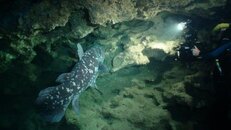I am new to diving and have no plan to do some thing crazy, but i wish to understand, from what i read bounce diving is unsafe,but i don't full understand all what makes a bounce dive a bounce dive, one thing is the single tank, right?
But what about lets say doing 50m or 165 feet. With a tank of ean 28-32 and a tank or 2 of air(ean 21) And having a dive plan and deco info all calculated before, and more experianced divers along, Is that too considered unsafe, or is that just tec diving.
Lastly is having the skill doing a padi or ssi course or can one get those skills from other experienced divers and taking small steps, with in you capasity.
I don't want to start a discussion about this course or that course, or how to kill yourself. But one about how to stay alive, be safely and intellegently ,slowly learn to go deeper.
Hi all! New on this board, and English is not my native language, so please bare with me

First of all, what are your motives for "going deeper"? It allways scares me a little when divers states that without any other reason than going deeper than they have been before.
When someone ask me if technical diving is fun, I tend to tell them no. As you venture deeper than 30-40-50-60 whatever meters, all that happens is that the ambient light becomes dimmer, there is less and less marine life, the colors fade away except from in the middle of your lightbeam and your ascent takes 2-3-4-5-6 times longer than the time you can actually dive on whatever it is that you are diving on.
If, however, there is a wreck, a cave or something specific that you want to see that happens to be at that depth, the reward can be well worth the effort

I have never understood deep diving on a reef or a wall

Now, i tend not to draw a thick red line between "technical" diving and "recreational" diving. It serves no useful purpose, and can easily distract divers from acknowledging the actual risks associated with that particular dive, in the end of the day, its all diving. Stating that Technical diving is more dangerous than recreational diving is at best imprecise when taken out of context.
As an example: The dives you have been doing in the +/-40m range with air only would not typically be considered "technical", whilst if I did that same dive only with 21/35 and a decobottle of 50 or 100% o2, it would. Yet, I would argue that my dive was safer than yours

However, the deeper/longer you go, the more severe the result of any unforeseen happening. As you start going past 30'ish meters, your available time to solve problems before you start taking on mandatory decompression and/or your breathinggas supply runs out is becoming increasingly shorter.
People do admitably respond differently to the effect of narcosis, but what doesn't vary is that past this range your brain will not perform at it's best if diving air or nitrox. That is not to mention the gas density/co2 considerations related to diving heavy air at these depths, witch is what can really create problems for you.
An incident that would be considered a inconvenience at 15m could be much more dramatic at 50, let alone diving on air.
The way from hero to zero is much shorter.
Taking a formal class with a talented instructor would/should give you the appropriate tools for diving this depths and beyond with an acceptable level of risk. This does cost time, money and effort, and it is not and does not have to be for everyone.
If, however, you are ready to take on the challenge economically and time/effort-wice, the revards are in my opinion well worth it

Best,
Bjørn






